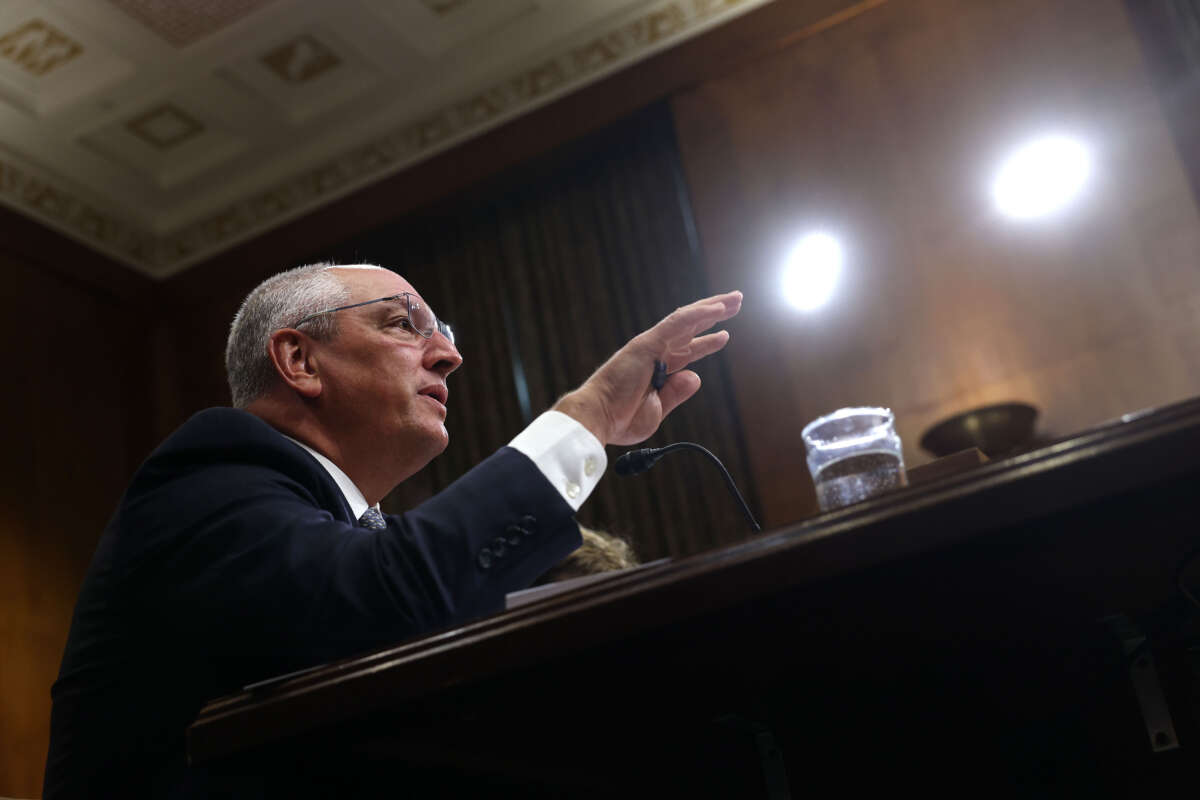Honest, paywall-free news is rare. Please support our boldly independent journalism with a donation of any size.
Anti-death penalty advocates in Louisiana are calling on Democratic Gov. John Bel Edwards to act within the next two weeks to commute the sentences of the vast majority of prisoners on death row, who first appealed to the governor in June following his public statement decrying capital punishment.
Fifty-six out of 60 prisoners on Louisiana’s death row filed clemency petitions with the state Board of Pardons and Committee on Parole in June, after the legislative session ended without the passage of a bill to abolish the death penalty.
They asked the board to commute their death sentences to life imprisonment without the possibility of parole and called on Edwards to act on what he said earlier this year was his strong opposition to the death penalty, owing to his religious beliefs as a Catholic and his concerns about wrongly executing innocent people.
As The Guardian reported on Thursday, nine death row prisoners in the state have been exonerated in the past 25 years. More than 80% of death penalty convictions in Louisiana have been overturned on appeal since prisoners secured the right to be represented by lawyers in the appeals process in 1999.
“Louisiana more often than not gets it wrong with the death penalty,” Samantha Kennedy, executive director of the Promise of Justice Initiative (PJI), an advocacy group in New Orleans, told The Guardian. The organization has joined the prisoners’ demand for clemency.
The prisoners who have joined the mass appeal include LaDerrick Campbell, who was diagnosed with schizophrenia and showed signs of paranoid delusions while in court but was nevertheless permitted to represent himself during his capital murder trial; and Jimmie Duncan, whose case rested on now-debunked bite-mark evidence.
Two-thirds of the death row prisoners in Louisiana are Black, while Black people make up only 33% of the state population.
“Looking at these cases collectively makes it clear that the system is fundamentally broken,” Cecelia Kappel, executive director of the Capital Appeals Project, which is helping to represent the prisoners, told the Times-Picayune in June. “These applications show that the same problems of racial disparity, intellectual disability, severe mental illness, trauma, innocence, and others repeat over and over in Louisiana’s death penalty cases.”
Despite evidence of the system’s flaws, the pardons board refused to conduct hearings on the 56 applications, setting them aside in late July after state Attorney General Jeff Landry, a Republican who is running to replace the term-limited Edwards in this year’s gubernatorial election, issued an opinion saying the petitions were invalid.
Landry said the board could only consider commutation petitions from prisoners up to a year after their most recent appeal rulings were handed down, a claim that Kennedy said is inaccurate.
“There is clear history that shows that this interpretation is improper and disingenuous—it has never been interpreted this way in the 25 years of this policy, a time period which includes applications for clemency from death row which were permitted under the same conditions,” Kennedy told The Guardian.
Edwards has about two weeks to instruct the board to consider the petitions in formal hearings, in order for officials to have time to review the cases before he leaves office in January, The Guardian reported.
Right now, there is a rare and historic opportunity to commute Louisiana's death row.
— The Promise of Justice Initiative (@JusticesPromise) July 31, 2023
Should Landry win the governor’s seat in the conservative state, he has said he plans to restart state-sanctioned executions, which haven’t been carried out in Louisiana in over a decade. He has also said he would consider using firing squads and the electric chair to bypass shortages of drugs used in lethal injections.
PJI is circulating a petition, gathering support for the push to convince Edwards to act on behalf of the prisoners, saying the governor “can still choose life over death, dignity over violence, right over wrong.”
“In refusing to consider these applications, the board has rescinded its own ability to use thoughtful, careful judgment to consider the worthiness of each human being,” said the group in a statement. “Hiding behind the smoke and mirrors of an unprecedented misapplication of its own bureaucratic rules, the board is attempting to cover its decision to condemn these people to die. It now rests on Gov. Edwards to instruct the board to set hearings for people on death row. Each person should have a chance to be considered for a life sentence.”
Kennedy told The Guardian the commutation of the sentences “would be a model for the south, and give a big push to the move away from capital punishment in the U.S.”
“This large clemency effort is historic and important,” she added.
Press freedom is under attack
As Trump cracks down on political speech, independent media is increasingly necessary.
Truthout produces reporting you won’t see in the mainstream: journalism from the frontlines of global conflict, interviews with grassroots movement leaders, high-quality legal analysis and more.
Our work is possible thanks to reader support. Help Truthout catalyze change and social justice — make a tax-deductible monthly or one-time donation today.
